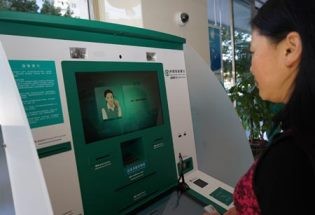A growing number of enterprises in China’s financial sector are starting to make use of face-recognition technology, as pioneered by WeBank, the nation's first Internet bank, which already has face-recognition capabilities in its app, the Shanghai-based China Business News reported.
The report cited that another firm, Pingan Puhui, uses a face-recognition procedure as a requirement for new borrowers, while jppay.com uses passwords based on face recognition.
According to the report, substantial progress in the development of the technology has been made in recent years due to the involvement of more than 10 development teams.
The report said that although the application of face-recognition technology in the financial sector is still facing roadblocks, it will soon prosper once the central bank allows remote account opening, especially the development of the bioassay verification on basis of facial recognition. The technology is reportedly important in the full confirmation of the identity of customers.
Bioassay verification technology ensures that the one standing in front the camera is a real person, rather than a mere imitation of a human face, the report said.
The report added that following the development of the DeepID in-depth learning model, which made a 99.15-percent success rate for face recognition, many enterprises have joined the field last year, making 2014 a milestone for the development of face-recognition technology in China.
DeepID was designed by Professor Tang Xiaoou and his team from the Chinese University of Hong Kong.
The article added that the face-recognition market is expected to grow bigger and reach 10 billion yuan ($1.57 billion) annually in three years, or over 100 billion yuan ($15.7 billion) in 10 years, as Internet technology further penetrates society.



























